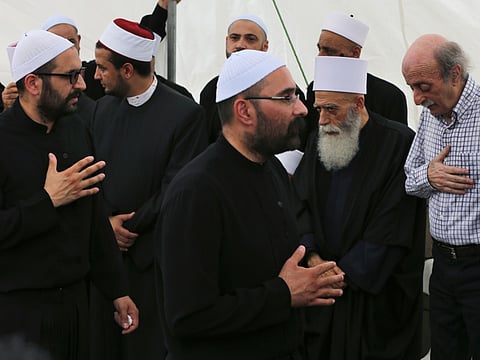Following Junblatt’s call, will Druze revolt against Al Assad?
Assassination of Shaikh Wahid Al Balous likely to tilt Druze away from the Syrian regime

Beirut: In June 2015, the Lebanese Progressive Socialist Party leader Walid Junblatt, the scion of a leading Druze family, declared that Syria’s embattled president, Bashar Al Assad, should be exiled to Siberia or an isolated desert to try to save the country. Junblatt determined early on that Al Assad would not survive, unlike Hezbollah who have been fighting alongside Syrian regime forces.
Despite high stakes and tensions, Junblatt consistently cautioned Druze in Syria to tread carefully and reject advances made by the regime’s lieutenants. Junblatt also postered that Al Assad would stop at nothing to survive, even if it meant the complete destruction of the country, including all non-Allawite minorities, inlcuding Christians and Druze.
Junblatt advised his fellow Druze in Syria that they were better off siding with the opposition to ensure their own future in a post-Al Assad Syria.
Aside from the current conflict, there has been a history of bad blood between Junblatt and the Al Assad family. Under Bashar’s father’s rule as president, Hafez ordered the assassination of Walid Junblatt’s father Kamal.
Though the Lebanese reconciled with the strongman for political reasons, Junblatt never forgave the Syrian regime---a feeling that was reciprocated since Ba‘ath leaders never tolerated dissent.
Ever the pragmatic leader, however, Junblatt swallowed his pride and looked after Druze interests as best as he could even if that meant shaking Al Assad’s hand for the cameras.
However, it seems that the straw which broke the camel’s back was the recent car bombing in Syria’s Sweida last week, that cost the lives of Shaikh Wahid Al Balous, along with fellow Imam Fadi Naim, Balous’ son and a bodyguard.
Balous, a prominent critic of both the Syrian regime and Islamist militants, was definitely targeted since the bomb that killed him was quickly followed by a second.
This was the work of a professional hit team that wished to ensure success, especially since the second detonation occurred near the hospital in the Dahr Al Jabal neighborhood, where victims would be rushed had they survived the first blast.
A few hours after news of Balous’ death became public, Junblatt urged Syrian Druzes to revolt against Damascus, affirming: “The the time has come for the honorable people, and they are many, the majority in Jabal Al Arab [also known as the Jabal Al Druze], to revolt against the regime that is practicing repression and wants to spark strife [between Druze] and their Syrian brothers.”
On Thursday, Junblatt received thousands of mourners in his Shouf stronghold, and told a shaken audience: “Shaikh Wahid led an uprising rejecting military service [for Druze] in the regime’s army”. He joined the victim in calling on the Druze of the Jabal not to participate in the suppression and murder of fellow Syrians and to stand firm against Damascus.
Importantly, other Druze leaders added the voices to Junblatt’s, with Talal Arslan, a pro-Al Assad Lebanese Druze leader—and son of one of the founders of the republic, the formidable Amir Majid Arslan who stood up to French colonial authorities, and won—condemned the “cheap” targeting of Druze shaikhs in the Jabal. Though Talal Arslan added a spin to his warning that “a conspiracy to tame Jabal Al Arab, which opposes all conspiracies carried out on Syrian territories by takfiri terrorism that threatens not only Syria and Lebanon, but the entire world,” it was evident that he too was upset. Wi’am Wahhab, yet another pro-Syrian former Lebanese Minister who served as Talal Arslan’s political advisor for years, did not mince his words either. An erstwhile pro-Hezbollah voice, Wahhab urged shaikhs of the Jabal to remain steadfast and exercise wisdom as they responded to provocations emanating from Damascus.
Although Syrian Druze were divided, as some stood with the regime while others sympathized with the opposition, the Balous assassination was likely to tilt the balance towards the opposition. It was a momentous event, one that may leave serious consequences for the Damascene, quickly running out of Syrian support.



